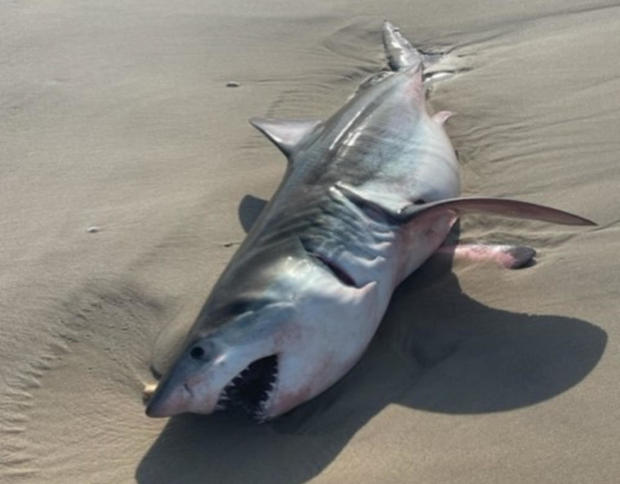Dead juvenile great white shark washes up on beach in Quogue
QUOGUE, N.Y. -- A dead shark was found on a beach in Suffolk County on Wednesday morning.
The shark washed up on the sand at Dune Road in Quogue, CBS2's Carolyn Gusoff reported.
A resident made the discovery at 9:30 a.m. on the beach, a 7-to-8-foot shark that the state Department of Environmental Conservation confirmed was a juvenile male great white.
Now, before you get alarmed, marine experts say they are not uncommon in our waters.
READ MORE: CBS2 talks to shark expert at New York Aquarium about rash of recent sightings
The South Shore of Long Island is believed to be a nursery for white sharks. The South Fork Natural History Museum has tagged more than 30 baby white sharks.
Their numbers are in the hundreds, from Manhattan to Montauk.
But after four shark bite incidents on Long Island beaches in recent weeks, Gusoff asked the experts if Wednesday's discovery should cause any greater concern.
Is a great white any more dangerous to humans?
"White sharks and all the sharks are only here to feed on small bait fish. Typically those negative interactions [happen] trying to get at the food source. We see the sharks not here to eat the people. They don't have the large pieces of flesh these people are in and near the food source," said Greg Metzger of the South Fork Natural History Museum and Nature Center.
Watch Gusoff's full interview with Greg Metzger
Experts were still looking for the dead shark after it washed back out to sea. They want to do a necropsy, claiming they can learn so much from how it died.
Meanwhile, they reiterated that all the shark activity this summer is a good sign that marine conservation efforts are working, adding it's up to humans to learn how to be safe in their waters.
Experts say don't swim early in the morning or at dusk when sharks are feeding, and if you see whales, dolphins, or schools of small fish, it could mean sharks are nearby, too.





